
SATURDAY 23
Rained last night and was a rainy morning, but it cleared off about noon. I went to the Land office today and was examined as the law directs for all clerks, but it is very much of a “humbug.” If it is wanted to keep an applicant out, it is a very easy matter to do it. I go again on Monday to learn the nature of the report in my case. Perhaps I am to be humbuged as a Democrat does not, in reality, stand much chance for a place in that Department. “We shall see.”
______
The three diary manuscript volumes, Washington during the Civil War: The Diary of Horatio Nelson Taft, 1861-1865, are available online at The Library of Congress.
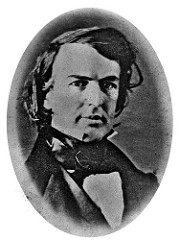
NOVEMBER 23d.—J. C. Breckinridge and Humphrey Marshall, of Kentucky, have been here; and both have been made brigadier-generals, and assigned to duty in the West. Although the former retained his seat in the Senate of the United States for many months after the war began, no one doubts that he is now with us, and will do good service.
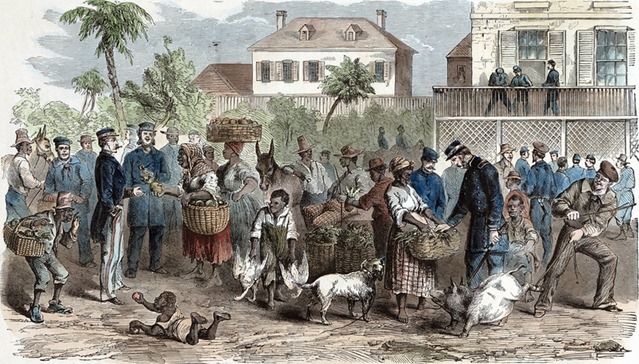
Scene at Beaufort, S.C.—Negro Hucksters Disposing of their
Produce to the Soldiers.—From a Sketch by W.T. Crane
From Frank Leslie’s American Soldier in the Civil War, page 430, 1895
The pleasures of honest ownership were as sweet to the soldiers, even in the land of plenty, as to the most exemplary Christian citizen. Then there came also the feeling of independence when the mess chest, so long dependent upon Uncle Sam’s liberality and thoughtfulness could be reinforced by fresh and unaccustomed viands. Hence, it is not strange that negro hucksters carried on a thriving trade in camp. The troops would purchase anything from cabbages to live stock. No doubt the man-o’-warsman driving off the young porker might have secured the same ration clandestinely, for whenever the negroes could get at the stores of produce the troops could also, if on foraging bent, but he probably made a very clever bargain, to his mind, and found immense satisfaction in exhibiting his prize on the road back to the rendezvous without being compelled to sneak along the by-ways and dodge the argus-eyed provost guard. The negroes likewise amused their new customers with their strange and grotesque dress, their rollicking humor and ready tongues. Generally speaking, the blacks may be classed as the Yankees of the South. Well aware of the mission of the Northern fighters on behalf of their race they relieved them of their greenbacks as eagerly and as mercilessly as though the process that of taking spoil of the Egyptians.
Print from wood engraving, probably originally black and white.

November.
Bessie Wolcott’s wedding came off very brilliantly. Carry went out to Astoria the day before. Mother and Hatty drove out together. Mary is said to have looked very handsome in white silk trimmed with black lace and white silk ruches. Hatty wore her crimson silk with white valencienne spencer or waist, and mother was very resplendent in velvet and feathers, stone cameos and black lace shawl. . . Charley drove out and back with his pony as rapidly as possible, as they had to drill for evacuation day, Charley’s first appearance in a procession. We all stood on the curbstone and we winked, and he winked, and Captain Ben Butler and others twinkled and winked, not daring to do more, so precise and martial was their array. . . . Have you received a large brown bale that you didn’t know what to make of? It is black curled hair. Eliza said whole pillows were much needed–underscoring the words. I don’t know what she means, unless that mere empty tickings to be filled with straw don’t answer. I have thought that the best way was to send you the hair, as it can be packed far closer than any number of ready-made pillows would be. The tickings are all made and will be along in Washington soon.

Nov. 22. The first death in our regiment occurred this morning. John Shepard of Company B died of typhoid fever. His remains will be sent to his home in Milford for burial.

FRIDAY 22
Saw the Sec’y this morning and presented Mr Lincolns letter. He was rather obstinate, could not restore me to the place I occupied in the Patent office at present possibly, but would give me a 2nd Class Clerkship in the Land Office for the present if I would accept of it. It is $1400 pr year. That is certainly better than no business in this extravagant City and I shall take it till I can do better. In that office I can take out patents.
______
The three diary manuscript volumes, Washington during the Civil War: The Diary of Horatio Nelson Taft, 1861-1865, are available online at The Library of Congress.
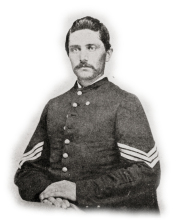
Friday, 22d–New troops are arriving all the time, and there are something like forty thousand men in the barracks at present. This camp has the appearance of being nearer the seat of war. It is a novel experience for us country boys to see so many men all armed for war, some on guard duty, others leaving for the front, while still others are arriving. The commissary work of the camp is thoroughly organized. Each company has a detail of cooks which serves a week at a time and then is relieved by another shift. The cooks go to the quartermaster and get the rations for five days at a time. The food is cooked in kettles hung in a row in the rear of the barracks, and is served on long stationary tables, each accommodating a full company. Our rations are about the same as at Camp McClellan, except that we have our first taste of “hard-tack” instead of bread.

NOVEMBER 22d.—We have information that the enemy have invaded and taken possession of the Eastern Shore of Virginia, Accomac and Northampton Counties. They invaded the two counties with a force of 3000 men, and we had only 800 to oppose them. Of course there could be no contest against such odds. They carried my tenant to Drummondtown, the county seat, and made him (I suppose) assist in raising the United States flag over the court-house.

November 22nd.–All the American papers have agreed that the Trent business is quite according to law, custom, and international comity, and that England can do nothing. They cry out so loudly in this one key there is reason to suspect they have some inward doubts. General McClellan invited all the world, including myself, to see a performance given by Hermann, the conjuror, at his quarters, which will be aggravating news to the bloody-minded, serious people in New England.
Day after day passes on, and finds our Micawbers in Washington waiting for something to turn up. The Trent affair, having been proved to be legal and right beyond yea or nay, has dropped out of the minds of all save those who are waiting for news from England; and on looking over my diary I can see nothing but memoranda relating to quiet rides, visits to camps, conversations with this one or the other, a fresh outburst of anonymous threatening letters, as if I had anything to do with the Trent affair, and notes of small social reunions at our own rooms and the Washington houses which were open to us.

21st. Visited Uncle Washington’s boat “The Rawson.” Heard Gough lecture.

Thursday, 21st–We took up our regular company and regimental drills again, and have a very fine drill ground.

THURSDAY, NOVEMBER 21, 1861.
Cloudy morning but rather a pleasant day. I have been engaged most of the day at home, heard the boys recite their lessons. Went to the Ave, bot some oil cloth for our Parlor stove and cut it down to fit. Wife went up to the Presidents to see Mrs Lincoln, did not see her. She however got a strong letter from the President to the Sec’y of the Interior in my favor. I shall present it tomorrow. Maj Watt acted for her in the matter with the Prest.
______
The three diary manuscript volumes, Washington during the Civil War: The Diary of Horatio Nelson Taft, 1861-1865, are available online at The Library of Congress.

NOVEMBER 21st.—My mysterious lieutenant was arrested this morning, on the western route, and proved, as I suspected, to be a woman. But Gen. Winder was ordered by the Secretary to have her released.

Nov. 20. Yesterday, having a day to myself, I visited Annapolis. I was greatly interested in visiting the old State House on account of the historic memories that cluster around it. I was shown up in the hall where Washington, in December, 1783, resigned his commission in the army to the Continental congress, then in session at this place. His resignation was a very solemn and formal affair, and as I stood in this venerable hall, my thoughts went back to those grand old days when our fathers struggled for independence. At the close of the revolution, Maryland offered to cede Annapolis as the Federal capital, but it was thought best to select a site on the Potomac river. Annapolis was originally designed as a great place, being the capital of the state, and possessing a fine harbor with a great depth of water, and long before Baltimore was at all noted, was the seat of wealth, refinement and extensive trade; but it is now chiefly distinguished as the seat of the United States Naval academy. The state house and Episcopal church are located in the centre of the city, and from these radiate all the streets.
To the eye of the stranger, the antique, moss-covered and vine-clad houses, with their deep embrasured windows and peculiar architecture, present a singular appearance. The Naval academy and Episcopal college present a striking contrast to the rest of the town. The buildings are large and of modern style, the grounds around them spacious and tastefully laid out. The Naval academy, located on the west side of the town, comprises an area of several acres, enclosed by a high brick wall. The buildings, of which there are several, are located [continue reading…]

Wednesday, 20th–The first thing this morning was to finish drying our clothing, after which we cleaned up and burnished our guns. There are several thousand troops, infantry, cavalry, and artillery here in camp. The barracks are ordinary frame structures and built around the drill ground. The Eleventh Iowa is located on the west side of the ground. We have large quantities of firewood on hand.

WEDNESDAY 20
Another fine day, much as yesterday. The great event of the day is the Grand Review which took place at Balls X roads some six or eight miles from the River in V.A. 75000 men or eighty Regts of Infantry, seven of Cavalry, and twenty Batteries of Artillery or 120 pieces. The Prest and most of the Cabinet were with Genl McClellan, his Staff was very Brilliant. No news of any particular importance afloat in the City today.
______
The three diary manuscript volumes, Washington during the Civil War: The Diary of Horatio Nelson Taft, 1861-1865, are available online at The Library of Congress.

NOVEMBER 20th.—I had a protracted and interesting interview to-day with a gaudily dressed and rather diminutive lieutenant, who applied for a passport to the Mississippi River, via Chattanooga, and insisted upon my giving him transportation also. This demand led to interrogatories, and it appeared that he was not going under special orders of the adjutant-general. It was unusual for officers, on leave, to apply for transportation, and my curiosity was excited. I asked to see his furlough. This was refused; but he told me to what company he belonged, and I knew there was such a company in Bishop or Gen. Polk’s command. Finally he escaped further interrogatories by snatching up the passport I had signed and departing hastily. But instead of the usual military salute at parting, he courtesied. This, when I reflected on the fineness of his speech, the fullness of his breast, his attitudes and his short steps, led me believe the person was a woman instead of a lieutenant. Gen. Winder coming in shortly after, upon bearing my description of the stranger, said he would ascertain all about the sex.

Bird’s Point, November 20, 1861
Part of Pitt’s (Col. W. Pitt Kellogg’s) cavalry are here. We are glad to see them as it will relieve us of considerable picket duty. But otherwise cavalry are of not much service in this brushy, swampy country. That fox of a Jeff Thompson that we chased down to New Madrid last week, had the impudence to follow us right back and we had hardly got our tents pitched here at the Point before he passed within 12 miles of us to the river above, and captured a steamboat. Report says that there were nearly a dozen officers on the boat, and a paymaster, with money to pay off the Cape Girardeau troops. Jeff is a shrewd one, and the man that captures him will do a big thing. Back in the country where we were, he made the natives believe that he whipped Ross and company at Fredericktown, and killed 400 federals with a loss of only ten of his men. Don’t it almost make you sick the way that 17th brag and blow about themselves? That affair at Fredericktown didn’t amount to a thing. From the best information I can get, there was not to exceed 50 Rebels killed, and I’m sure not that many. Thompson is stronger to-day than ever. This thing of sending infantry after him is all bosh, although we tried it again yesterday. It failed of course. The boys came back through the rain last night about 10, tired and mad as the deuce. A thousand cavalry may possibly get him some day, but they will be sharp ones, sure. In this fight at Belmont 1,200 of our men at first completely whipped 2,400 of theirs, four regiments, then the whole of ours, 2,600 ran like the devil before and through 5,600 of theirs. These are the true figures.
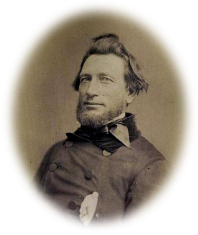
20th.–This morning we received marching orders to Bailey’s, to have a grand review of the whole army. Very few had any confidence in that part of the order announcing the purpose–a review. All believed it was to take Fairfax, and then perhaps to move forward on Centreville and Manassas ; but all were disappointed. It was a “Grand review,” –a very grand one–such as I doubt whether this continent ever witnessed before. It may never witness the like again. There were about one hundred thousand men in battle array; not in one long line stretching far beyond the reach of vision, and leaving the imagination to picture what we could not see, but all in sight at once, on an immense plain, in squares and columns, marching and countermarching, charging and retreating. The President was there; General McClellan and the Prince de Joinville were there; all the elite were there. But to the poor soldiers it was a very hard day. They marched heavy, with knapsacks and all the equipments of a soldier. They started early, marched ten miles, were then several hours under review, and then marched back to camp. Many gave out, and were left by the way side, to come up when they can; the rest of us are back in camp to-night, worn out and heartily tired of grand reviews. I hope that the crowding of my hospital is not to be one of the result of the overwork.

November 20th.–To-day a grand review, the most remarkable feature of which was the able disposition made by General McDowell to march seventy infantry regiments, seventeen batteries, and seven cavalry regiments, into a very contracted space, from the adjoining camps. Of the display itself I wrote a long account, which is not worth repeating here. Among the 55,000 men present there were at least 20,000 Germans and 12,000 Irish.

Tuesday, 19th–We started down the river again at daylight and reached St. Louis at 3 p. m. We landed and marched to Benton Barracks, where we were to be at home. Just as we left the boat it commenced to rain and we marched the whole way in a downpour of rain which soaked our clothes through and through. Reaching the barracks we built fires to dry our clothes before retiring for the night.

TUESDAY 19
A delightful day, bright but cool. Called up to the “White House” this morning to see Maj Watt, did not find him. Walked into the “East room” to see the New Carpet and papering, all very elegant. Called at Willards, met Doct Harris of the R.I. Brigade. He was released from Richmond on his parole. Got letters from Surgeon Barnes and Jas Bourne. Went to Wall Stevens & Co for Barnes and to [McCle[lle]n?] for Bourne. Made fire Board for parlor and spent the evening at home reading.
______
The three diary manuscript volumes, Washington during the Civil War: The Diary of Horatio Nelson Taft, 1861-1865, are available online at The Library of Congress.

NOVEMBER 19th.—To-day Monsieur Paul, French Consul, applied in person for passports on behalf, I believe, of some French players (Zouaves) to Norfolk. Of course I declined granting them. He grew enthusiastic, and alleged that British subjects had enjoyed the privilege. He said he cared nothing for the parties applying in this instance; but he argued vehemently against British subjects being favored over French subjects. I sent a note concerning our interview to the Secretary; and while Monsieur Paul still sat in the office, the following reply came in from the Secretary: “All you need do is to say to the French Consul, when he calls, that you obey your instructions, and have no authority to discuss with him the rights of French subjects. J. P. B.” Monsieur Paul departed with “a flea in his ear.” But he received an invitation to dine with the Secretary to-day.
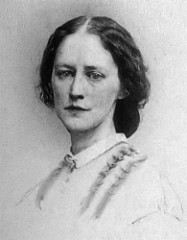
Jane Stuart Woolsey to Georgeanna and Eliza.
New York, November, 1861.
Dear Girls: I went to the provisional Hospital here to see if the volunteers wanted anything. Mrs. Darragh took me all over, and said she wanted woolen shirts and socks very much. So I sent the requisition to the society and she will get all she wants there. . . . Mrs. D. also suggests slates for the men to scribble on, cypher on, do puzzles, etc.; thought they would be very nice, in which I agree. Perhaps the idea may be useful to you. . . . Do you remember Peck, the man all twisted with rheumatism? He is getting well, and is a great gourmand. They let him have anything he wants. While we were there he remarked sentimentally, “I say, send we some more of that roast pig, won’t you.” I shall adopt the New York volunteers to the mild extent of taking them some papers occasionally. . . . Mrs. Bennett, poor old soul, called yesterday to tell of the death of her son with typhoid dysentery in the camp, and, what with her grief and childish elation at having news to tell and being an object of sympathy, was most pathetically comic,– “dead and gone! dear, dead and gone! and this is his picter that he sent home to his mar,” was her greeting to everyone that came down stairs; “and I hope you’ll all be ready in time, my dears. It’s bad enough to be left by the cars, but worse not to be ready when you come to die.” Her great desire seemed to be to see and thank a drummer boy, who in the last few days of her son’s life walked a mile and a half every day to get him a canteen of spring water. He was consumed with thirst and could not drink the river water. . . . Do the surgeons know that you can have money at your disposal for delicacies, as well as clothes, etc.? Let them know it, if you have not, and spend, spend indefinitely. I say to myself often, “fifty or sixty thousand dollars would give quite a lift, why do I cumber the ground?” So if you don’t want to see me dead and the ducats in my coffin directed to the Sanitary Commission, say what I can do or send.

November 19th.–I rarely sat down to write under a sense of greater responsibility, for it is just possible my letter may contain the first account of the seizure of the Southern Commissioners which will reach England; and, having heard all opinions and looked at authorities, as far as I could, it appears to me that the conduct of the American officer, now sustained by his Government, is without excuse. I dined at Mr. Corcoran’s, where the Ministers of Prussia, Brazil, and Chili, and the Secretary of the French Legation, were present; and, although we did not talk politics, enough was said to show there was no dissent from the opinion expressed by intelligent and uninterested foreigners.










